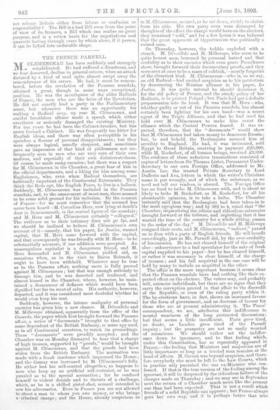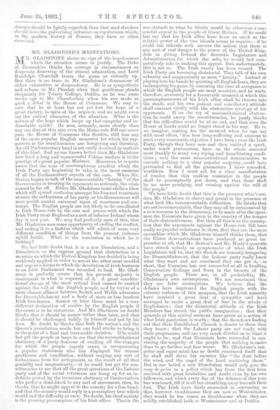THE FRENCH PARNELL.
MCLnMENCEAU has been suddenly and strangely • rehabilitated. He had suffered a disastrous, and we fear deserved, decline in general esteem, when an attack dictated by a kind of mad spite almost swept away the remembrance of his errors. He had, it must be remem- bered, before the revelation of the Panama scandals, attained a great, though in some ways exceptional, position. He was the mouthpiece of the older Radicals of France, the men who are the heirs of the Revolution. He did not exactly lead a party in the Parliamentary sense, but whenever there was an opportunity for making a Radical coup, up rose M. Cl6menceau, and amidst breathless silence made a speech which either overthrew or seriously damaged the existing Ministry. For ten years he has been the Cabinet-breaker, but has never formed a Cabinet. He was frequently too bitter for English ideas, and there was often perceptible in his speeches a flavour of personal disappointment ; but they were always logical, usually eloquent, and sometimes gave an impression of that kind of pitilessness not un- frequently seen in men who are very sure of their own motives, and especially of their own disinterestedness. Of course he made many enemies ; but there was a respect for M. Clienenceau in the Chamber, a great fear of him in the official departments, and a liking for him among some Englishmen, who, even when Radical themselves, are habitually impatient of the Continental Extremists. They think the Reds apt, like English Peers, to live in a balloon. Suddenly, M. Clemenceau was included in the Panama scandals, and, to the amazement of most men, there seemed to be some solid ground for his inclusion. By the consent of France—for we must remember that the accused has never been heard—M. Cornelius Herz, now lying at death's door in Bournemouth, is the central figure of the scandals ; and M. Herz and M. Cliimenceau certainly " collogued." The evidence as to their intimacy does not go far, and we should be inclined to believe M. Cldniencea.u's own account of it—namely, that his paper, La. ,Tu.stice, wanted capital, that M. Herz came forward with the capital, and that consequently he was friendly with M. Herz—to be substantially accurate, if one addition were accepted. An unscrupulous capitalist is a dangerous friend, and M. Herz demanded and M. Cl6menceau yielded aid, on occasions when, as in the visit to Baron Reinach, it ought to have been withheld. Whatever may be true as to the Panama affair, nothing more is fully proved against M. 016menc,eau ; but that was enough seriously to damage him, and be was deserted and traduced, and almost hissed in the Chamber, where, however, he main- tained a demeanour of defiance which would have been dignified but for its want of calm. His authority, however, departed, and it was considered most doubtful whether he would even keep his seat. t J Suddenly, however, the intense malignity of personal enemies has given him a new chance. M. D4roulede and M. Millevoye obtained, apparently from the office of the Cocarde, the paper which first brought forward the Panama affair, a series of " documents " brought to that office by some dependent of the British Embassy, or some spy used, as in all Continental countries, to watch its proceedings. These " documents " were greedily accepted ; and the Chamber was on Monday dismayed to hear that a charge of high treason, supported by "proofs," would be brought against M. Cl4menceau, and that the proofs had been stolen from the British Embassy. The accusation was made with a frank insolence which impressed the House ; and the dismay was increased by M. Ch5menceau's folly. He either lost his self-control altogether, as happens to men who keep up an artificial self-restraint, or be was putzled as to the special accusation ; for he confined himself to violent denials and to threats of a challenge, which, as he is a skilled pistol-shot, seemed intended to cow his adversaries. Even in France you are not allowed to shoot a man to whom you owe money, or who brings a criminal charge ; and the House, already suspicious as to M. Ch5inenceau, seemed, as he sat down, visibly to shrink from his side. His own party even were dismayed by thoughts of the effect the charge would have on the electors, they remained "cold," and for a few hours it was believed that the great opponent of Opportunism was politically a ruined man.
On Thursday, however, the bubble exploded with a stench. M. Thlroulede and M. Millevove, who seem to be quite honest men, bemused by personal hatred and that credulity as to their enemies which even grave Frenchmen show, brought forward their documentary proofs, and they were seen at once to be a mass of rubbish,—mostly forgeries of the clumsiest kind. M. Chlmenceau—who is, as we say, an old Radical—had excited suspicion as to his patriotism by denouncing the Russian alliance in his paper, La Justice. It was quite natural he should denounce it, for the old policy of France, and the steady policy of her Radicals, is to protect Poland ; but Paris had got a definite prepossession into its head. It was that M. Herz—who, whether guilty or not of the Panama scandals, has almost certainly been fighting for his own hand—was a secret agent of the Triple Alliance, and that he had used his hold over M. Cl6menceau to make him resist the alliance which the Central Powers feared. It was ex- pected, therefore, that the " documents " would show that M. Ch5menceau had taken money to denounce Russia; but, lo and behold, the Boulangists accused him of servility to England. He had, it was intimated, sold Egypt to Great Britain, receiving in payment £20,000, while M. Rochefort, of all human beings, received £3,000. The evidence of these nefarious transactions consisted of copies of letters from Sir Thomas Lister, Permanent Under- Secretary to our own Foreign Office, addressed to Mr. Austin Lee, the trusted Private Secretary to Lord Dufferin and Ava, letters in which the writer's Christian name is put wrongly, and of which the substance, as we need not tell our readers, is absurd. The Foreign Office has no fund to bribe M. Cl6menceau with, and is about as likely to bribe M. Rochefort, as M. Rochefort, for all his abominable opinions, is to take a bribe. The Chamber instantly said that the Boulangists bad been taken-in in the most egregious way ; and by 382 to 4, voted that "the Chamber, stigmatising the odious and ridiculous calumnies brought forward at the tribune, and regretting that it has wasted the time of the country for a whole sitting, passes to the order of the day." M. D6rounde and M. Millevoye resigned their seats, and M. Ch5menceau, "radiant," passed on to dine with a party of English friends. He will benefit exceedingly, just as Mr. Parnell did, by the over-credulity of his enemies. He has not cleared himself of the original slur—subservience to a bad speculator for the sake of fresh capital supplied to his paper—but he has cleared himself, or rather it was necessary to clear himself, of the charge of treason ; and his full acquittal in the one case will be held by many to include an acquittal in the other.
The affair is the more important because it seems clear that the Panama scandals have had nothing like their ex- pected effect on the electors. The voters may, and probably will, ostracise individuals, but there are no signs that they carry the corruption proved in that affair to the discredit of the Republic, or even of the ruling party within it. The by-elections have, in fact, shown an increased favour for the form of government, and no decrease of favour for those who are at present administering it. The Times' correspondent, we see, attributes this indifference to mental weariness of the long protracted discussions ; but that seems a little insufficient. Paris grew tired, no doubt, as London grew tired of the Parnell inquiry ; but the peasantry are not so easily wearied of sensations. We should rather set the indiffer- ence down to ignorance, and to that feeling which, under this Constitution, has so repeatedly appeared in France,—the feeling that Ministers and majorities are of little importance so long as a trusted man remains at the head of affairs. M. Carnot was beyond suspicion, and there- fore everybody else must be left to the Law Courts, which in practice only punished the one ex-Minister who con- fessed. If that is the true version of the feeling among the ignorant, it will be deepened by the ridiculous failure of the charges made on Thursday ; and we may see in September next the return of a Chamber much more like the present one than had been expected. That is not a result which friends of a solid Republic can approve ; but France always goes her own way, and it is perhaps better that true eharges should be lightly regarded, than that mad slanders should have the pulverising influence on reputations which, in the modern history of France, they have so often exercised.



















































 Previous page
Previous page